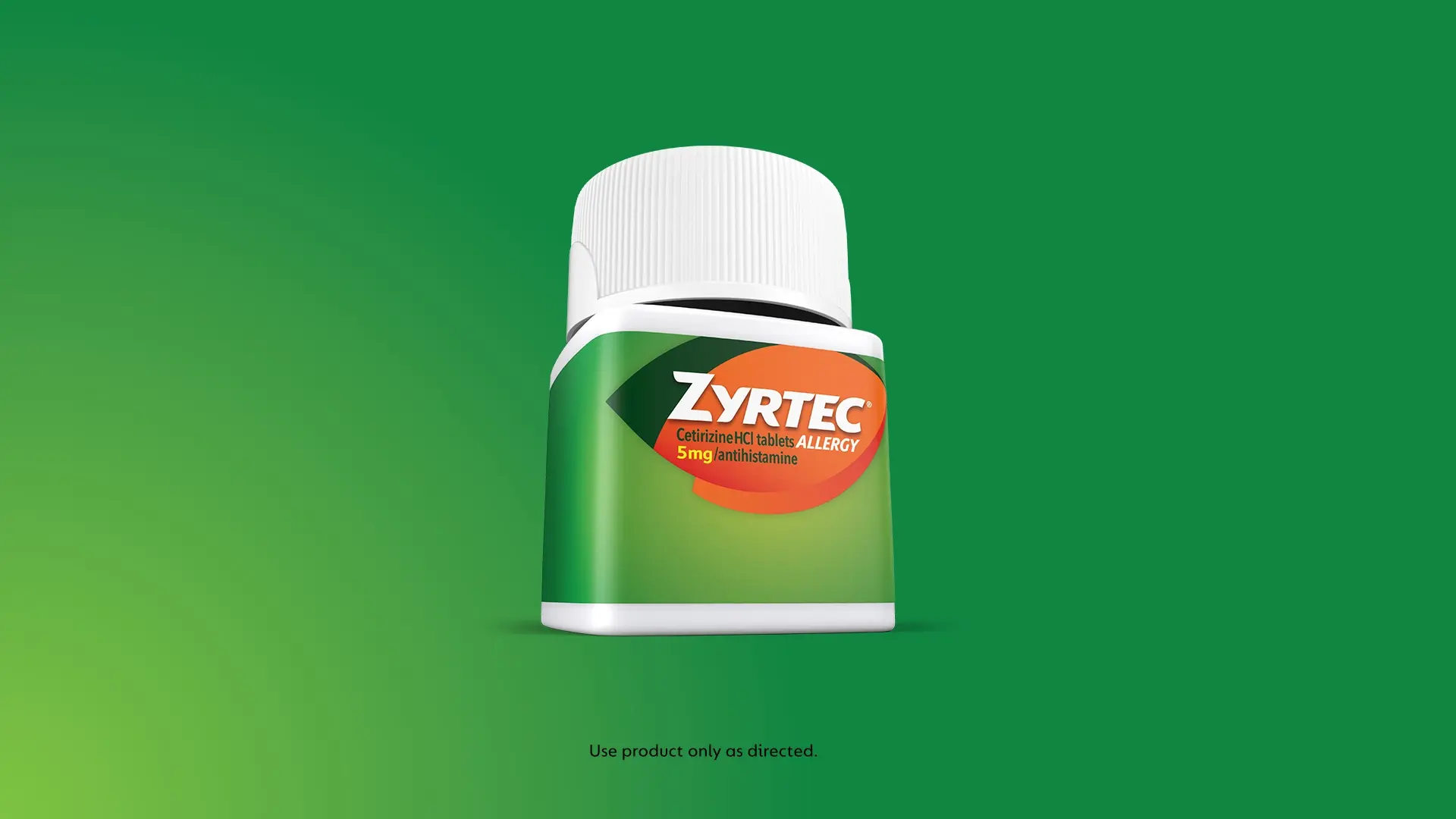Allergy Symptoms in Seniors and Older Adults
With advancing age, our body's response to allergens can evolve, resulting in altered reactions or the development of new sensitivities — also known as adult-onset allergies. Recognizing symptoms for what they are is important for effectively managing allergies in seniors.
Common upper respiratory allergy symptoms in older allergy sufferers include:

Sneezing

Itchy, runny nose

Itchy, watery eyes

Itchy, sore throat
For more information on how allergies can change as we get older, head over to our “Can Allergies Get Worse with Age?” page.
Common Causes of Allergies in Seniors
Given the complexity of health in older populations, it’s important to distinguish between allergy symptoms and signs of other medical conditions. For instance, persistent coughing or difficulty breathing could be symptoms of an underlying respiratory issue. This is where understanding common causes of allergies can help you get to the root of your symptoms to get the care you need.
Several factors can contribute to the development of allergies in adulthood:
Environmental changes: Moving to a new location can expose you to allergens your body may not have encountered before or in the same quantities, such as dust and dust mites, pollen, mold, and pet dander.5
Immune system changes: Your immune system can become more sensitive or you may respond differently to allergens as you get older.6
Lifestyle changes: Changes in diet, stress levels, and exposure to new substances can also trigger allergic reactions.5,7
Genetics: If you have a family history of allergies, you may be susceptible to developing them at any age.8
Why is it Important for Seniors to Treat Allergy Symptoms?
Mild allergy symptoms like sneezing, runny nose, or itchy eyes may seem manageable at first, but if left untreated, they may escalate into other health issues.9,10 For seniors, this is particularly concerning as they might already be managing other chronic conditions like asthma. It’s possible untreated allergies can make other conditions like asthma worse or more challenging to manage.
Uncomfortable allergy symptoms can also make it harder to engage in social activities or maintain an active lifestyle.11 It’s essential for seniors to address their allergy symptoms promptly to prevent them from interfering with daily routines and overall well-being.
For more detailed information on the potential consequences of untreated allergies and how they can affect health, visit our Untreated Allergies page.
Benefits of Taking ZYRTEC® for Seniors
24-hour allergy relief with specific dosing for 65+ allergy sufferers: ZYRTEC® 5mg provides temporary relief from allergy symptoms for 24 hours, with specific dosing for seniors, so you don’t have to wonder or ask a healthcare professional what dose to take.
No interaction with fruit juices or antacids: Unlike some other over-the-counter allergy medications, ZYRTEC® 5mg does not interact with fruit juices or antacids.
How to Manage and Treat Pollen Allergies
The good news? There are many ways you can manage and treat pollen allergy symptoms.

1. Clean your house regularly: Common indoor allergens like dust can accumulate quickly. Regular cleaning, including vacuuming with a HEPA filter, can help reduce indoor allergens.12 If cleaning is physically demanding, consider hiring help or asking family members to assist.

2. Keep windows closed: Pollen and outdoor allergens can easily enter your home through open windows. Keeping them closed, especially during high pollen seasons, can help minimize exposure.13 Use air conditioning to maintain a comfortable indoor temperature in the meantime.

3. Use an air purifier: Investing in a high-quality air purifier can help filter out allergens from the air, providing a cleaner indoor environment. Look for models that are easy to operate and maintain.12,13

4. Be mindful of outdoor time: Limit outdoor activities during peak pollen times, usually early morning and on windy days, to reduce exposure to allergens. If you enjoy outdoor activities, try to schedule them for times when pollen counts are lower.

5. Stay hydrated: Drinking plenty of fluids can help thin mucus and keep your airways clear, alleviating some allergy symptoms.14 Keep a water bottle handy throughout the day to remind yourself to drink regularly.

6. Create a comfortable sleeping environment: Use hypoallergenic bedding and wash sheets weekly in hot water (130° F) to reduce allergens.13 Ensure your bedroom is well-ventilated and free from dust.

7. Consult with a healthcare provider: Regular check-ups can help manage allergies effectively. Your doctor can recommend appropriate medications or treatments tailored to your needs.
Treat your Allergy Symptoms with ZYRTEC® 5mg
For temporary relief from seasonal and other upper respiratory allergy symptoms, ZYRTEC® 5mg Allergy Relief Medicine Tablets can be an effective choice for adults aged 65 and older.
Before starting any new medication, it is important to consult with your doctor, especially if you are taking other medications or have existing health concerns.
References:
American Association of Retired Persons. 5 Types of Allergies That Can Become More Common With Age. Accessed March 3, 2025.
Cardona V, Guilarte M, Luengo O, Labrador-Horrillo M, Sala-Cunill A, Garriga T. Allergic diseases in the elderly. Clin Transl Allergy. 2011;1(1):11. Published 2011 Oct 17. doi:10.1186/2045-7022-1-11
Cleveland Clinic. Can You Develop Allergies as an Adult? Accessed March 3, 2025.
Ventura MT, Scichilone N, Paganelli R, et al. Allergic diseases in the elderly: biological characteristics and main immunological and non-immunological mechanisms. Clin Mol Allergy. 2017;15:2. Published 2017 Feb 3. doi:10.1186/s12948-017-0059-2
Kim BJ, Lee SY, Kim HB, Lee E, Hong SJ. Environmental changes, microbiota, and allergic diseases. Allergy Asthma Immunol Res. 2014;6(5):389-400. doi:10.4168/aair.2014.6.5.389
Weyand CM, Goronzy JJ. Aging of the Immune System. Mechanisms and Therapeutic Targets. Ann Am Thorac Soc. 2016;13 Suppl 5(Suppl 5):S422-S428. doi:10.1513/AnnalsATS.201602-095AW
Dave ND, Xiang L, Rehm KE, Marshall GD Jr. Stress and allergic diseases. Immunol Allergy Clin North Am. 2011;31(1):55-68. doi:10.1016/j.iac.2010.09.009
Ortiz RA, Barnes KC. Genetics of allergic diseases. Immunol Allergy Clin North Am. 2015;35(1):19-44. doi:10.1016/j.iac.2014.09.014
Skoner D. Complications of allergic rhinitis. Journal of Allergy and Clinical Immunology. Accessed March 4, 2025.
Akhouri S, House SA. Allergic Rhinitis. StatPearls Publishing LLC. Accessed March 4, 2025.
HarvardStreet.org. The Connection Between Seasonal Allergies and Mental Health. Accessed March 4, 2025.
EPA. What is a HEPA filter? Accessed March 4, 2025.
Mayo Clinic. Allergy-proof your home. Accessed March 4, 2025.
Mayo Clinic. Cold remedies: What works, what doesn't, what can't hurt. Accessed March 4, 2025.
Links to other parties’ articles and websites are provided for convenience only. Kenvue is not responsible for their content.




